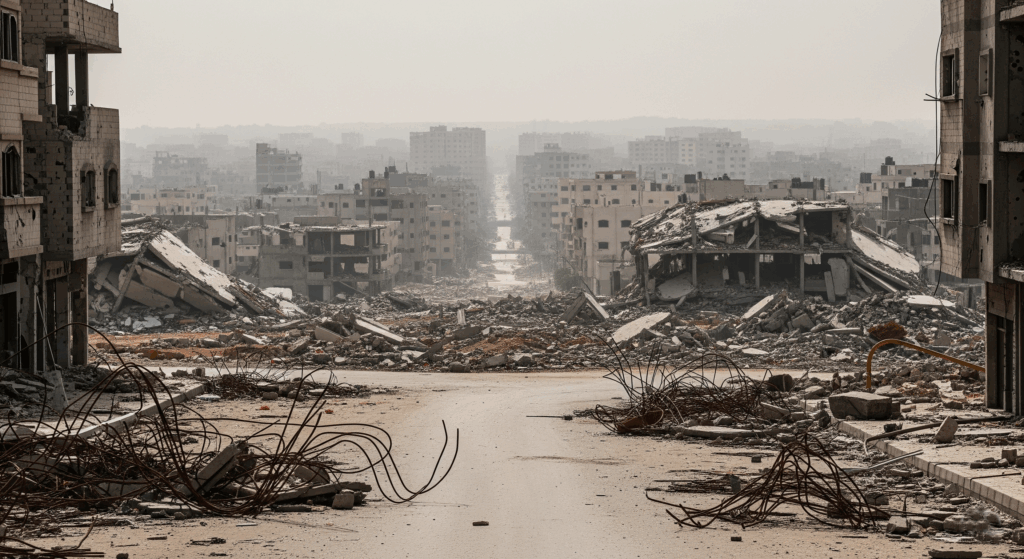
La guerra non cambia mai/War never changes

IT
Il titolo è una famosa citazione videoludica e, come spesso accade, le narrazioni fantastiche riescono a regalarci aforismi fortissimi quanto semplici e capaci di imprimersi nell’immaginario collettivo. Ma cosa non cambia mai? Lo sappiamo tutti: la morte e la distruzione.
La cosa che però rende tutto ancora più triste è che la consapevolezza della misura di questi fatti rimane spesso estremamente limitata. Non riusciamo veramente a comprendere l’entità dei danni e del dramma sociale, un po’ perché lo si vuole nascondere, un po’ perché è anche difficile nella pratica riuscire a monitorare la situazione di vaste aree soggete a conflitto armato.
In situazioni come questa riuscire a mappare il territorio evidenziando tutte le sue criticità, oltre ovviamente a essere una risorsa per la sopravvivenza di chi vede distrutta la propria terra, diventa di fatto anche un atto politico finalizzato alla lotta per la verità e la giustizia.
Ma cosa possiamo fare di concreto per raggiungere questo obiettivo? Oggi abbiamo la possibilità tecnologica di rendere le comunità delle macchine sociali capaci di monitorare il proprio territorio, di interagire per la sua salvaguardia e per la sopravvivenza della comunità stessa.
Gli smartphone sono alla portata di tutti e le possibilità di potersi connettere a una rete internet diventano sempre maggiori anche in territori le cui infrastrutture sono distrutte e questo grazie ai satelliti.
I conflitti che stiamo indirettamente vivendo con la crisi ucraina e palestinese potrebbero apparirci molto più chiari di quanto riusciamo a comprendere e questa trasparenza potrebbe aiutare le popolazioni coinvolte, sia come sensibilizzazione politica, sia come mezzo di informazione per coordinare in modo ottimizzato gli aiuti umanitari.
Ma se sono qui a scrivere questo post ovviamente il motivo è che WikiLogs aspira a diventare lo strumento universale per gestire anche situazioni estreme come quelle dei conflitti armati.
Questa tecnologia potrebbe avere un ruolo importante per il futuro di quelle guerre “che non cambiano mai” e questa luminosa possibilità spinge la mia associazione ad andare avanti nel suo sviluppo sempre con maggiore forza e risolutezza. Stay Tuned!
EN
The title is a famous video game quote and, as is often the case, fantastic narratives manage to give us aphorisms that are as powerful as they are simple and capable of imprinting themselves in the collective imagination. But what never changes? We all know: death and destruction.
What makes it all the sadder, however, is that awareness of the extent of these facts often remains extremely limited. We cannot really comprehend the extent of the damage and the social drama, partly because we want to hide it, partly because it is also difficult in practice to monitor the situation in vast areas subject to armed conflict.
In situations like this, being able to map out the territory, highlighting all its criticalities, as well as obviously being a resource for the survival of those who see their land destroyed, also becomes a political act aimed at fighting for truth and justice.
But what can we do concretely to achieve this goal? Today we have the technological possibility to make communities into social machines capable of monitoring their territory, of interacting for its preservation and for the survival of the community itself.
Smartphones are within everyone’s reach and the possibilities of being able to connect to an internet network are growing even in territories whose infrastructure is destroyed, and this is thanks to satellites.
The conflicts we are indirectly experiencing with the Ukrainian and Palestinian crises may appear much clearer to us than we realise, and this transparency could help the populations involved, both as political awareness and as a means of information to optimise the coordination of humanitarian aid.
But if I am here writing this post, the reason is obviously that WikiLogs aspires to become the universal tool for managing even extreme situations such as armed conflicts.
This technology could play an important role for the future of those wars ‘that never change’, and this bright possibility pushes my association to move forward in its development with ever greater strength and resolve. Stay Tuned!